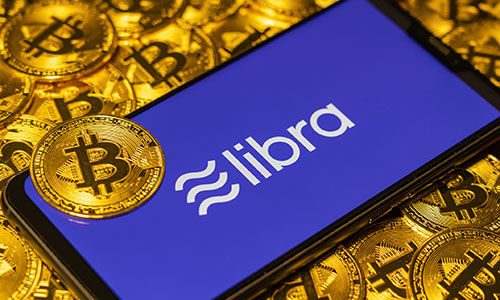International discussion about Facebook’s digital currency Libra shows no sign of abating and will continue to dog Switzerland’s financial center. The Geneva-based Libra Association is attracting mainly criticism from world politics, Adrian Schatzmann of the Swiss Bankers Association writes.
 By Adrian Schatzmann, strategic advisor of the Swiss Bankers Association
By Adrian Schatzmann, strategic advisor of the Swiss Bankers Association
When German finance ministers get hot under the collar there is often an echo in Switzerland. Olaf Scholz, social democrat and German finance minister, recently responded critically to the announcement of the private digital currency Libra, saying that a «competition» between governmental and private currencies could have a negative effect on the currency monopoly of the European Central Bank (ECB). Although in Switzerland statements by German ministers are not always applauded – this time further consideration is merited.
It is worth taking a moment to reflect: the vehemence with which the blanket rejection is expressed gives pause. Internationally a proper storm has erupted over the Libra Association with headquarters in Geneva. Why is it that Europe, with its market economy, but also the USA and the central banks fear Libra like demons fear holy water? And why is it that the banks are by no means taking a similar defensive position?
Global Politics Doesn’t Want Libra
An initial answer probably lies in the links between politics and central banks: although most central banks are institutionally independent, their monetary policies are set according to economic trends which are at least partly politically driven. The European Central Bank, for instance, has been trying for the last ten years to compensate political omissions with low-interest rates. And the state institutions do not want to lose this exclusive transmission of monetary policy into the real economy in the future.
In short: competition is undesirable – even though in practice citizens choose the currency in any case as a means of payment or a means to maintain value, since rationally this promises them more stability. There is nothing undemocratic about that and it happens already today where, for instance, the dollar operates as a shadow currency.
Facebook And the Question of a Suitable Originator
The political aversion is also explained by the originator: Facebook is a suitable candidate to prompt rejection. One popular argument against Libra refers to a lack of trust in the currency due to its driving force, Facebook. And yes, Libra – and Facebook – must first earn this trust. Facebook’s recent track record on the treatment of private data doesn’t exactly inspire confidence in this respect. But still: lack of trust alone is no reason to ban Libra. No-one is obliged to use the currency. No-one who doesn’t trust Libra is obliged to have anything to do with it.
Libra Needs the Banks
The major tech firms have without doubt changed the world – from mail order shopping to the way friendships are organized. Is it possible with, for instance, new ideas, major investments, the cooperation of large, global companies and the potentially resulting in low marginal costs, to destabilize the established banking industry as well? Could the Libra Association set up a system that transforms banking as radically as Amazon once transformed the book trade?
Hardly. A parallel currency with exchange rate risks like Libra as a means of payment in Switzerland and countries with similar exchange rate stability will have a hard time for the foreseeable future. In Switzerland Libra is not a viable payment method within the country as long as rents, wages and a large part of the living costs are paid in francs.
Domestic Currency Exchange Remains Crucial
Even if Libra should one day become established in international payment transactions, in most cases there would still be an exchange into domestic currency, either through the banks directly by way of Libra accounts or through digital bureaus of exchange. However, the banks will only accept funds from the Libra network if the network can be proven to have a completely clean record in terms of money laundering and tax transparency.
Fulfillment of regulatory requirements all over the world will be a Herculean task for the Libra Association. The comment by the Julius Baer bank on KYC (Know Your Customer) serves to highlight the numerous challenges: millions of Facebook users – and thus potential users of Libra – particularly in developing countries, have no verified identity. Without verified identity, there can be no integration into international and established financial systems.
Applying for a Banking Licence?
One theory expressed in various ways in the discussions is that Libra can ultimately enable total bypass of the established financial system, i.e. the banks. Firstly: private persons have no direct access to the Swiss National Bank – with or without Libra. Private clients will keep their deposits in francs - and thus with a licensed bank - and that is where they will also take up loans. So even in a world with Libra, the Swiss commercial banks will continue to provide the established and central services.
It is conceivable that the Libra Association will itself try and obtain a banking license and thus bypass the established banks. But the Association would have to hold a valid license in every country, which would massively increase the costs. A cooperation with existing banks seems a much easier option for both sides.
Political Resistance
Libra may indeed one day play a role in international payment transactions. In Switzerland wages, rents and everyday expenses are paid in francs. In the long term, Libra needs to be linked to the banking system – nationally as well as internationally. Successful cooperation could, therefore, represent an opportunity for Switzerland’s finance industry.
Providing the currency not only satisfies all regulatory requirements but also actually overcomes the significant global political resistance it is currently facing.



































